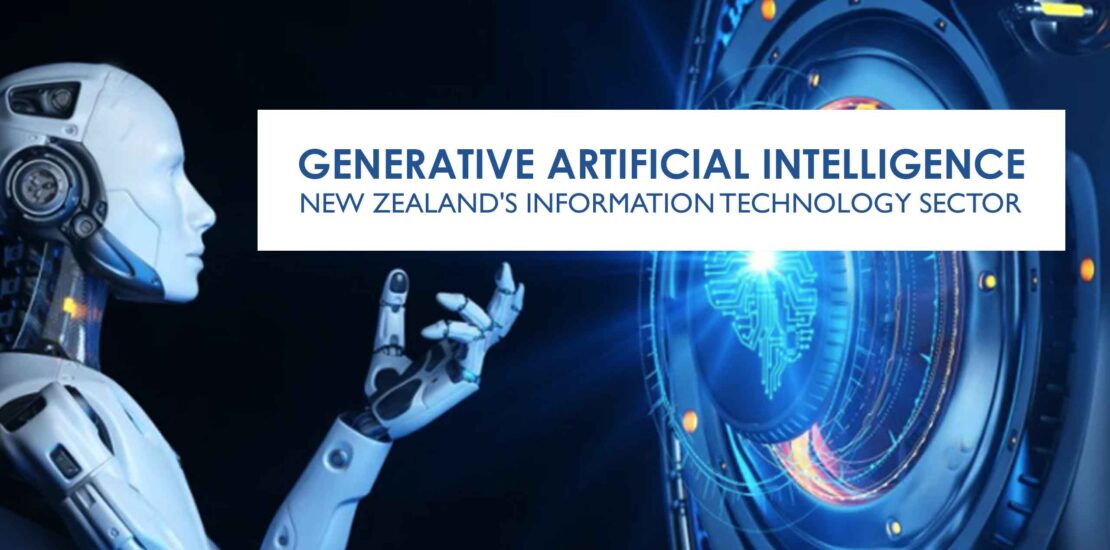Generative Artificial Intelligence and New Zealand’s Information Technology (IT) sector
- 29/12/2024
- Posted by: admin
- Categories: digital marketing, Generative AI, Information Technology, New Zealand

Generative Artificial Intelligence (AI) is revolutionizing industries worldwide, and New Zealand’s Information Technology (IT) sector is no exception. This technology enables machines to produce content—ranging from text and images to music and code—mimicking human creativity. Its integration into New Zealand’s IT landscape is fostering innovation, enhancing productivity, and reshaping business operations.
Economic Impact and Growth
The adoption of generative AI is poised to significantly boost New Zealand’s economy. Projections suggest that by 2038, generative AI could contribute an additional NZ$76 billion to the nation’s GDP, representing a 15% increase over baseline forecasts. This growth is attributed to enhanced productivity, with generative AI automating routine tasks and allowing workers to focus on higher-value activities. On average, it is estimated that each worker could reclaim approximately 275 hours annually, time that can be redirected towards innovation and strategic initiatives.
Applications Across Sectors
In New Zealand’s public sector, generative AI is already making a tangible impact. For instance, tools like Microsoft 365 Copilot have been employed to streamline data analytics, aiding in decision-making and improving employee satisfaction. Organizations utilizing AI tools have reported saving more than an hour per day, with over a fifth saving two hours or more, enabling them to dedicate more time to innovation and enhancing job satisfaction.
The private sector is also experiencing transformative changes. Businesses are leveraging generative AI to create high-quality content, make data-driven decisions swiftly, and personalize customer interactions. In marketing, AI-generated content allows for tailored campaigns, while in sales, it aids in drafting personalized communications and analyzing data for accurate forecasting. Additionally, IT departments benefit from AI-assisted code generation and automated support tasks, boosting overall efficiency.
Challenges and Considerations
Despite its advantages, the integration of generative AI presents challenges. Concerns about data security, accuracy of AI-generated outputs, and compliance with data protection laws have been raised. A survey of businesses in regions including New Zealand revealed that only 10% regularly use AI assistants, with apprehensions about errors and data security being significant deterrents.
Moreover, the environmental impact of AI technologies cannot be overlooked. The substantial energy consumption required for AI computations contributes to a growing carbon footprint. As New Zealand strives to meet its climate commitments, addressing the sustainability of AI technologies becomes imperative.
Future Outlook
The generative AI market in New Zealand is on a rapid growth trajectory, with projections indicating a 46.48% increase between 2024 and 2030, culminating in a market volume of approximately US$2.4 billion by 2030.
To fully harness the potential of generative AI, New Zealand’s IT industry must focus on building digital maturity, investing in infrastructure, and fostering a culture of innovation. By addressing challenges related to data security, ethical considerations, and environmental impact, the sector can ensure that the adoption of generative AI contributes positively to the economy and society at large.
References
- Microsoft News. (2024, November 25). How Generative AI is Driving Results in New Zealand’s Public Sector. Retrieved from https://news.microsoft.com/en-nz/2024/11/25/how-generative-ai-is-driving-results-in-new-zealands-public-sector/
- New Zealand AI. (n.d.). Generative AI Applications. Retrieved from https://newzealand.ai/generative-ai
- The Times. (n.d.). Companies’ Fears Grow About AI Assistants. Retrieved from https://www.thetimes.co.uk/article/companies-fears-grow-about-ai-assistants-jwv0dcl6g
- University of Waikato. (n.d.). NZ Encouraging the Use of AI But Outsourcing the Risks. Retrieved from https://www.waikato.ac.nz/news-events/news/nz-is-encouraging-the-use-of-ai-but-its-largely-outsourcing-the-risks-and-societal-costs
- Statista. (n.d.). Generative AI Market Outlook in New Zealand. Retrieved from https://www.statista.com/outlook/tmo/artificial-intelligence/generative-ai/new-zealand

